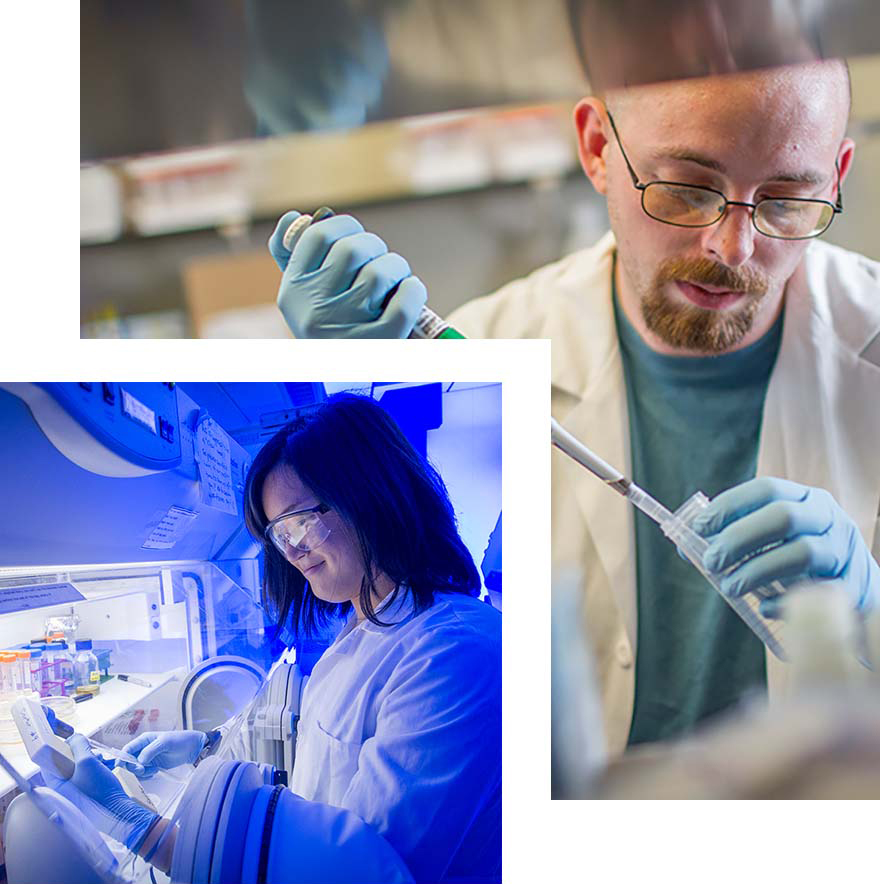Research
A focus on research has been central to the work of the UNC Division of Endocrinology, both in training and care. Faculty from the Division of Endocrinology lead and collaborate on projects with investigators across campus in basic science, translational science, clinical trials, population science and policy work.
UNC’s success is based on a culture of collaboration – 60% of research awards at UNC involve multiple investigators, 48% multiple departments and 33% across more than on UNC school. UNC is ranked 22nd in the world in Endocrinology and Metabolism based on work that is ongoing in the Division, the School of Medicine and across the UNC campus. Moreover, UNC’s prominence in global endocrinology and metabolism is not exclusively based in the division, but on the vast research efforts at UNC. As a single example, in diabetes research there are over 200 investigators with funded projects including 72 active NIH grants. UNC is one of only a handful of institutions where all six health science schools—Dentistry, Medicine, Nursing, Pharmacy, Public Health, and Social Work—are ranked in the top 15 nationally in NIH funding. Moreover, these schools are clustered within a single compact campus (<1 mile in diameter), contributing to a highly collaborative academic environment.
Find Clinical Trials
For more than a quarter of a century, UNC Endocrinology has been at the cutting edge of research in the areas of diabetes and obesity. Investigators within the division have conducted more than 300 federal, industry, and investigator-initiated protocols. UNC Endocrinology has played critical roles in seminal Phase I-IV clinical trials examining most current diabetes and obesity treatments, both drugs and devices. Many of these trials have led to meaningful improvements in the lives of our patients with T1DM, T2DM and obesity.
Much of this clinical and translational research has been conducted in the UNC Endocrinology Diabetes and Obesity Clinical Research Unit (ENDO CRU), located within UNC SOM’s Eastowne Medical Office Building. The ENDO CRU is conveniently located two floors above the UNC Diabetes and Endocrinology Clinics which facilitates recruitment in trials and collaboration between investigators and clinicians. At any given time, there are over 40 active projects involving UNC Endocrinology faculty and trainees in diabetes and obesity research.
Collaboration is at the heart of successful research and faculty within UNC Endocrinology are also deeply involved in research collaborations across the school, state and country. The NC Diabetes Research Center, one of 17 NIDDK P30-funded centers nationally, encourages “an interactive diabetes research community across four premiere research institutions in North Carolina” – UNC, Duke, Wake Forest School of Medicine and North Carolina A&T, the largest HBCU in the nation.
The UNC Nutrition Obesity Research Center, one of eleven NIDDK P30-funded centers nationally aims “to enhance the efficiency, productivity, effectiveness and multidisciplinary nature of nutrition and obesity-related research”. With core facilities directed as animal metabolism phenotyping, metabolism and metabolomics, precision nutrition, behavioral assessments, clinical assessments, and interventions, it is a powerhouse of broad-based research activities.
Faculty: Buse, Diner, Dostou, Ghorbani, Klein, Young, Hwang
The Bone and Mineral laboratories at UNC Endocrinology, under the direction of Drs. Janet Rubin and Maya Styner, perform NIH-supported research to improve understanding of bone formation in the adult skeleton, applying cellular and mouse models.
Our main goal is to understand how physical force, exercise, benefits bone health.
- At the cellular level, physical force reinforces the (cytoskeletal) structure of skeletal stem cells. Tension dependent processes cause changes in gene expression, directing these stem cells to become bone-forming osteoblasts, thereby preventing their transformation into marrow adipocytes.
- At the animal level, we study how exercise (voluntary wheel running) stimulates bone formation and represses bone marrow adiposity in mice. Our more recent work asks whether exercise continues to have a beneficial effect on bone into advanced age, where musculoskeletal tissues are senescent.
Our work has led to a emphasis with our clinic patients to encourage exercise as a key positive regulator of skeletal health, which may in turn lower fracture risk .
Faculty: Styner, Rubin
Clinical informatics is a broad discipline studying the application of novel technologies and data science methods to clinical research and operations. Members of the Division of Endocrinology and Metabolism have made major contributions in this field, particularly in the area of computable phenotyping, or the use of electronic health record or insurance claims data to define and identify patient populations for research. Endocrinology investigators have used computable phenotyping to identify pediatric patients with diabetes, electronically differentiate among patients with Type I and Type II diabetes, and match eligible patients with appropriate clinical trial opportunities. Our investigators have also pioneered big data infrastructure to analyze electronic health record data from dozens of healthcare institutions across the country, enabling efficient and impactful data-driven research—most recently, in the domain of COVID-19 and long COVID.
Faculty: Emily Pfaff
